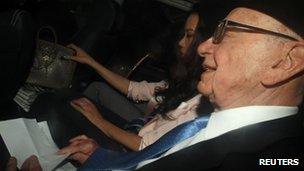Leveson Inquiry: Murdoch admits missing hacking 'cover-up'
- Published
Rupert Murdoch: "Someone took charge of a cover-up which we were victim to"
Rupert Murdoch says there was a "cover-up" at the News of the World but he insists it was kept hidden from him.
The News Corp boss told the Leveson Inquiry into media ethics he and senior executives were "shielded" from the extent of phone-hacking at the tabloid, which he was forced to close.
He said: "I also have to say that I failed, and I am very sorry about it."
A former member of staff said later it was a "shameful lie" to suggest he had been involved in a cover-up.
On claims that "one rogue reporter" was responsible for phone-hacking, Mr Murdoch said senior executives were all misinformed about its extent.
"I do blame one or two people for that... someone took charge of a cover-up we were victim to and I regret that."
He said a lawyer, whom he described as a "drinking pal" of NoW journalists, forbade staff to report instances of phone hacking.
Mr Murdoch also told the inquiry he and senior executives were misinformed from what was going on.
After the inquiry had adjourned for the day, former News International legal manager Tom Crone said Mr Murdoch could have been referring "only" to him when he mentioned a company lawyer. He added that Mr Murdoch's claim was a "shameful lie".
Mr Murdoch also said the editor, Colin Myler, had failed to report back.
Mr Myler, who became editor in 2007, told the inquiry last year that he had accepted phone hacking must have been limited because police had not shown otherwise.
But he said he feared "bombs under the newsroom floor" in the form of possible widespread wrongdoing in the past.
In other developments during his second day of evidence at the Royal Courts of Justice, 81-year-old Mr Murdoch said:
He was "surprised" by the size of the £425,000 plus costs settlement to Professional Footballers' Association chief executive Gordon Taylor over hacking
He had spent hundreds of millions of dollars investigating activities in his papers after the hacking scandal
He does not tell journalists to promote his company's TV channels, shows, or films in his papers
He was "shocked" to hear from counsel to the inquiry, Robert Jay, that News International had not co-operated with a police investigation into hacking.
Mr Murdoch went on to apologise to all the "innocent" staff at the tabloid who lost their jobs when the newspaper closed after journalists hacked into the voicemail of murdered schoolgirl Milly Dowler.
"I am guilty of not having paid enough attention to the News of the World, probably throughout all of the time that we've owned it."
Explaining why he closed the NoW, he said after the Dowler story was given "huge publicity" he "could feel the blast coming in the window, almost" and panicked.
He said he regretted the phone-hacking scandal at the newspaper, adding: "It is going to be a blot on my reputation for the rest of my life."
BBC political correspondent Ross Hawkins said Mr Murdoch at times painted himself as a victim, saying people had lied about him, but the tycoon ultimately argued that he had now built a new company.
Government contact
Earlier, Mr Murdoch said he was "surprised" by how long email contacts between one of his executives and the government went on during his bid to gain control of broadcaster BSkyB.
But he added that Frederic Michel, who repeatedly refers to contacts with Culture Secretary Jeremy Hunt, had done nothing wrong.
Mr Hunt's special adviser Adam Smith has quit over the emails and the minister faces calls to follow him.

Media mogul Rupert Murdoch said on Wednesday he had never asked a prime minister for a favour
The media mogul said he did not believe he had ever met Mr Hunt and he "certainly didn't discuss" the bid.
News Corporation is the parent company of News Group, which owned the News of the World, and owner of 39% of BSkyB.
Broadcast regulator Ofcom, which is investigating BSkyB's fitness to own a broadcasting licence, has asked News Group newspapers for the documents disclosed in civil cases relating to phone hacking.
At the end of his seven hours of evidence to the inquiry, Mr Murdoch urged Lord Justice Leveson not to over-regulate the press.
"I think you have a danger of putting regulations in place which will mean there will be no press in 10 years to regulate.
"And I honestly believe that newspapers and all they mean, mistakes and qualities, are a huge benefit to society."
Downing Street denial
On Thursday, the inquiry also heard about the number of meetings between Prime Minister David Cameron and Mr Murdoch.
BBC political correspondent Norman Smith said Downing Street had disputed claims that Mr Cameron could have had up to eight meetings since he became prime minister, saying there had been only two meetings.
On another occasion Mr Murdoch was in the audience during a speech by Mr Cameron, and there was also a social event, Downing Street said.
Our correspondent adds that the reasons for Downing Street's denials are that it wants to shield Mr Cameron from any controversy, quash the idea that Mr Murdoch has easy access to the prime minister, and dispel the impression that there is some sort of inner sanctum of influence within the Establishment.
A revised list of meetings between Mr Murdoch and British prime ministers was provided to the Leveson Inquiry by Mr Murdoch after Thursday's session.
It listed four events with Mr Cameron - two meetings, one dinner and the News Corp summer party - as well as one "proposed" meeting and one "possible" breakfast.
Meanwhile, culture select committee chairman John Whittingdale has told the BBC he hopes its report into phone hacking will be published on Tuesday.